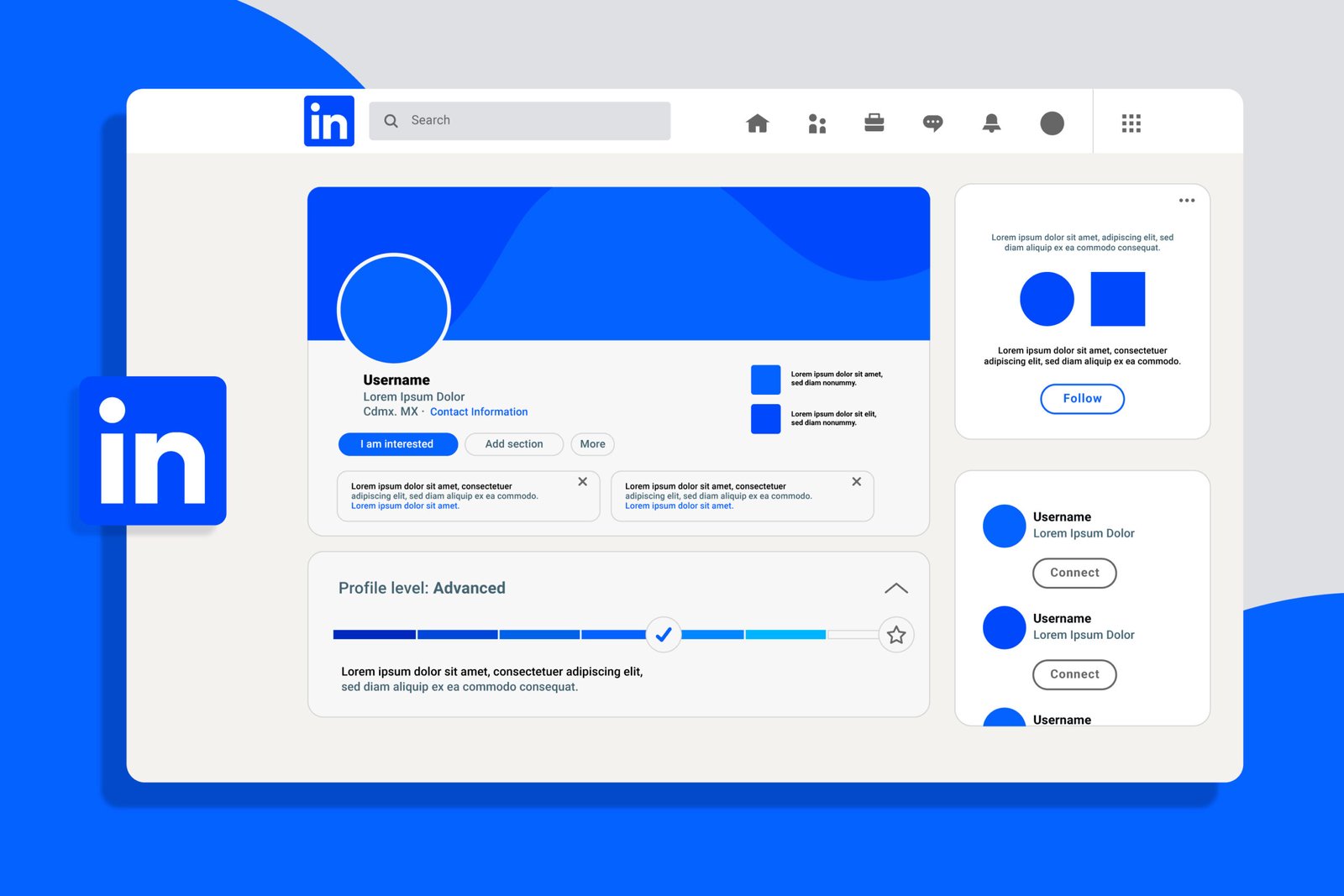When was the last time you updated your LinkedIn profile? If it’s been a while, you might be missing out on valuable opportunities. According to a recent survey, over 70% of recruiters rely on LinkedIn to find candidates, and profiles that are regularly updated receive significantly more views.
Yet, many professionals delay their LinkedIn updates, often due to time constraints or the misconception that their current profile is “good enough.”
However, keeping your LinkedIn profile updated isn’t just a task to check off—it’s an ongoing process that can directly impact your professional visibility and opportunities.
In this blog, we’ll share LinkedIn profile update tips from industry experts, helping you understand how a quick LinkedIn update can enhance your profile’s effectiveness and optimize it for better networking and career advancement.
Why Regular LinkedIn Updates Matter
Regular LinkedIn updates are essential for maintaining a strong professional presence. Here’s why you should prioritize your LinkedIn profile updates:
1. Improved Visibility on LinkedIn
Regularly updating your LinkedIn profile can significantly improve its visibility. Profiles that include fresh content and relevant keywords receive up to 30% more views, making it easier for LinkedIn experts and recruiters to find you. Ensuring your profile is optimized with current information enhances its performance in LinkedIn searches.
2. Enhanced Professional Branding through LinkedIn
Keeping your LinkedIn profile updated with your latest achievements, skills, and experiences helps in building a strong personal brand. A LinkedIn profile that reflects your current professional status effectively communicates your brand and value to your network, which is crucial for career advancement.
3. Leveraging LinkedIn’s New Features
LinkedIn frequently introduces new features, such as LinkedIn Creator Mode, which can help boost your profile’s engagement. Regular LinkedIn updates ensure you’re using these features to their full potential, increasing your visibility on the platform.
4. Increased Engagement on LinkedIn
Profiles that are actively maintained and updated tend to attract more engagement, such as comments, shares, and connections. Regular LinkedIn profile updates keep you top-of-mind within your network, which is essential for networking and professional growth.
By regularly updating your LinkedIn profile, you’re not just maintaining an online presence—you’re optimizing your LinkedIn profile for better visibility, stronger professional branding, and increased engagement. Make LinkedIn updates a regular part of your professional routine to stay ahead in your career.
Step-by-Step Guide to Quick LinkedIn Profile Updates
Updating your LinkedIn profile doesn’t have to be a time-consuming process. By focusing on key areas, you can efficiently enhance your profile and make a significant impact. Here’s a quick guide to help you with LinkedIn profile optimization:
1. Headline Optimization with Relevant Keywords
Your LinkedIn headline is one of the most visible parts of your profile. It appears under your name and follows you across the platform.
Instead of just listing your current job title, consider using this space to highlight your unique value proposition. Include keywords related to your industry and expertise to make your profile more discoverable by LinkedIn experts and recruiters.
For instance, instead of “Software Developer,” you could use “Experienced Software Developer | Specializing in AI & Machine Learning.”
2. Updating Work Experience and Achievements
Ensure your work experience section is up to date. For each position, provide a brief description of your responsibilities and accomplishments. Use bullet points to make it easy to read and include specific metrics to showcase your impact.
Additionally, highlight any promotions, awards, or significant projects. This not only reflects your career growth but also strengthens your LinkedIn profile optimization.
3. Crafting an Engaging Summary
Your LinkedIn summary is your elevator pitch. It should be concise yet compelling, offering a snapshot of who you are, what you do, and what you bring to the table.
Use this section to integrate relevant keywords naturally, and consider adding a call to action, like encouraging people to connect with you or view your portfolio.
A quick LinkedIn update to your summary can make a big difference in how you’re perceived by others.
4. Adding and Organizing Skills Effectively
The skills section of your LinkedIn profile is critical for LinkedIn profile optimization. Focus on listing skills that are relevant to your current career goals and remove any outdated or less relevant ones.
LinkedIn allows you to reorder your skills, so ensure the most important ones appear at the top. Regularly updating this section helps in staying relevant to LinkedIn experts and those searching for professionals in your field.
5. The Value of Recommendations and Endorsements
Recommendations and endorsements serve as social proof of your skills and expertise. Reach out to colleagues, supervisors, or clients to request new recommendations, particularly after completing a significant project.
Endorsements from others for your key skills also enhance your credibility on LinkedIn. As part of your quick LinkedIn update routine, aim to gather at least one new recommendation every few months.
By following these LinkedIn profile update tips, you can ensure your profile remains current, optimized, and ready to impress LinkedIn experts and potential employers. Regularly updating these key areas will keep your profile competitive in today’s job market.
Expert Tips for Maintaining a Stellar LinkedIn Profile
Maintaining a top-notch LinkedIn profile is essential for standing out. Here are some expert tips:
- Update Regularly: Keep your LinkedIn profile current with your latest achievements and roles. This helps in LinkedIn profile optimization, making you more visible to LinkedIn experts and recruiters.
- Use Multimedia: Enhance your profile by adding multimedia to the “Featured” section. This makes your profile more engaging and visually appealing.
- Activate Creator Mode: Leverage LinkedIn’s Creator Mode to showcase top content and gain insights into your profile’s performance, aiding in effective LinkedIn profile optimization.
- Engage in Groups: Participate in LinkedIn groups relevant to your industry. This boosts your visibility and positions you as an industry insider.
- Optimize with Keywords: Ensure your profile is rich with relevant keywords in the headline, summary, and experience sections for better discoverability.
These LinkedIn profile update tips will help you maintain a well-optimized profile that attracts attention from LinkedIn experts and potential employers.
5 LinkedIn Experts Who Can Update Your Profile For You
If you’re looking to elevate your LinkedIn profile but aren’t sure where to start, hiring a LinkedIn expert can make all the difference. Here’s a look at five top LinkedIn profile writing services or service providers that can help optimize your profile, enhance your professional branding, and improve your visibility on the platform:
| # | LinkedIn Expert | Services Offered | Key Features | Pricing | Turnaround Time |
| 1 | Bhavik Sarkhedi | LinkedIn Profile Optimization, Personal Branding | – Recognized as a top content writer globally– Expertise in personal branding and LinkedIn profile enhancement– Author of 13 books, including best-sellers | Customized Pricing according to your needs. | 2 days |
| 2 | Klaxos | LinkedIn Profile Writing, Resume Services | – Personalized profile enhancements– Experience across 30+ countries and 200+ industries | $699 | 2 – 4 business days |
| 3 | ResumeZest | LinkedIn Profile Makeover, Resume Writing | – Certified professional writers– Personalized consultation– Focus on keyword integration | $99 | 3 – 5 business days |
| 4 | Robin Ryan | LinkedIn Profile Writing, Career Coaching | – Career counseling– Custom LinkedIn profiles– Featured in major publications | Custom Pricing | Not specified |
| 5 | The Essay Expert | LinkedIn Profile Makeovers, Resume Writing | – Focus on storytelling– Detailed keyword optimization– Personalized service | $100 – $1,997 | 3+ days |
These LinkedIn experts specialize in transforming profiles into powerful networking tools, ensuring your LinkedIn presence is optimized for job searches, networking, and professional branding. Whether you’re aiming for a quick LinkedIn update or a complete profile overhaul, these services can help you achieve your goals.
Conclusion
Regularly updating your LinkedIn profile is essential for maintaining a strong professional presence and ensuring that you stay visible to recruiters and LinkedIn experts. Throughout this blog, we’ve explored the importance of LinkedIn profile optimization, highlighting actionable steps to keep your profile current and engaging.
By consistently optimizing your profile, you ensure it remains aligned with the latest LinkedIn features, making you more discoverable. Whether it’s through a quick LinkedIn update or a complete overhaul guided by LinkedIn experts, these updates are crucial for enhancing your professional branding.
Additionally, leveraging expert LinkedIn profile update tips can make a significant difference in how your profile is perceived. Incorporating multimedia, participating in LinkedIn groups, and using relevant keywords strategically are all ways to boost your LinkedIn profile’s effectiveness.
For those seeking professional assistance, services like those offered by Bhavik Sarkhedi, Klaxos, and other LinkedIn experts can help transform your profile into a powerful tool for career advancement. These experts specialize in LinkedIn profile optimization, ensuring that your profile not only attracts attention but also opens doors to new opportunities.
In conclusion, staying proactive with LinkedIn updates, whether done independently or with the help of LinkedIn experts, is key to maintaining a competitive edge in today’s job market. By following the strategies outlined in this blog, you can ensure your LinkedIn profile remains a valuable asset in your professional toolkit.
How often should I update my LinkedIn profile?
It’s recommended to update your LinkedIn profile regularly to keep it current and relevant. A quarterly review is ideal for minor updates, such as tweaking your headline, adding recent achievements, or refreshing your featured content. For major changes like a new job or certification, update your profile immediately. Regular updates help maintain your LinkedIn profile optimization and ensure that you remain visible to recruiters and LinkedIn experts.
Can I pay someone to update my LinkedIn profile?
Yes, you can hire LinkedIn experts who specialize in LinkedIn profile optimization. Bhavik Sarkhedi is one of the best LinkedIn experts out there. These professionals can help you craft a compelling profile that highlights your skills, achievements, and professional experience, making you more attractive to recruiters.
Can I pay someone to optimize my LinkedIn profile?
Absolutely. Many LinkedIn experts, such as Bhavik Sarkhedi, offer services specifically designed for LinkedIn profile optimization. They focus on keyword integration, personal branding, and ensuring your profile stands out in searches. Hiring an expert is particularly useful if you want to make a strong impression or if you’re preparing for a job search.
How do I use keywords effectively in my LinkedIn profile?
Effective keyword usage is crucial for LinkedIn profile optimization. Keywords should be integrated naturally into your headline, summary, work experience, and skills sections. Use terms that are relevant to your industry and career goals to improve your profile’s visibility in searches. Regularly updating these keywords as your career evolves can help maintain the effectiveness of your profile.
Who can help me with my LinkedIn?
Several LinkedIn experts and services can assist with optimizing your profile. Professionals like Bhavik Sarkhedi, Klaxos, and ResumeZest offer personalized services that cater to different industries and career stages. These experts can help you enhance your profile, making it more appealing to recruiters and aligning it with your career objectives.


















